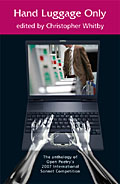Open Poetry Ltd Launched the 2007 International Sonnet Competition
In 2007 Open Poetry Ltd has launched an international sonnet competition. This was the competition's website.
Content is from the site's 2007 archived pages.
International Sonnet Competition launched
Open Poetry Ltd has launched an international sonnet competition, closing October 31, 2007. First prize is £1,400, and the judging panel comprises Susan Bassnett (UK academic and poet), Jacqueline Osherow (USA poet) and Don Paterson (UK poet).
The Open Poetry Competition invites entries from anywhere in the world - or the universe for that matter - for our inaugural competition running from 10 January 2007 to 31 October 2007 (closing at midnight). Top prize is a £1400, second prize is £750 and third prize is £350 (minima). If the number of entries allow us to increase the prize money, we will. The judges may at their discretion award additional prizes of up to £100 for entries that received high commendation but did not make it into the top three. Also we hope to publish the best entries in book form at the end of the competition.
Entries can be submitted via this website or by post any time until midnight (GMT) on 31 October 2007. If submitting on-line by clicking on the 'On-Line Entry Form' menu, payment of the entry fee is via a Paypal payment page (automatically in GB Pounds Sterling). If submitting by post, you must include an application form, either downloaded from this site (click on 'Download Entry Form' menu) or as can be found in one of our publicity leaflets. Whether you enter or not, if you write sonnets, you can also add your name to our list of sonnet poets (use 'Sonnet Poets' menu).
If you think you can help publicise the competition, please do so by word of mouth, email, local radio or any other means at your disposal. We would be happy to send a quantity of leaflets and bookmarks for giving out at societies, clubs etc, so please contact us via the 'Ask for a Leaflet' link on the left, if you would like us to do so.

The Rules |
||||||||
|
The main rules are very simple: |
||||||||
|
|
||||||||
|
||||||||
The Judges 2007 |
||||||||||||||||||||||||||||||||||||||||||||||||
|
||||||||||||||||||||||||||||||||||||||||||||||||
Traditional Sonnets |
||||||
|
And if no peece of Chronicle wee prove, Italian sonnets tend to have 11syllables (excluding elisions) in each line, while English sonnets tend to have 10 syllables per line in an iambic pattern (unstressed syllable, stressed syllable), although most poets will play with metre at one time another. One of the points about repetitive metric patterns, just like beats in music, is the opportunity they create to suddenly change the pattern or beat for effect, whether that be emphasis, surprise, a sense of speeding up or slowing down, etc. If you are really interested in the history of the sonnet, we recommend Michael Spiller's book cited at the top of this page (ISBN 0-415-07744-3 & 0-415-08741-4 pbk) from which much of the above has been gleaned. You may also wish to look at www.sonnets.org, and there are many other sites devoted to sonnets on the Internet. |
||||||
Some Ideas |
|||||||||||||||||||||||||||||||||||||||||||
|
When people discuss sonnets, they usually argue for two forms: Petrarchan and Shakespearean, although we can also talk of Spenserian. If you are uncertain about these structures, which are largely to do with rhyme scheme and metre, and want to find out more, click here. They proved popular forms and have been much imitated, but they are not by any means the only forms for a sonnet. After all, like other poetry, a sonnet does not have to rhyme. And just as the Shakespearean sonnet form was an innovation on the Petrarchan, so your sonnets can be innovatory too. This is the 21st century. You can imitate a traditional style with modern content, or play with the style too and come up with your own format within the 14 line basic rule, which is the only structural rule we are operating. Sonnets are actually incredibly flexible, despite the apparent constriction of the line number. If you do want to rhyme, what about breaking with tradition in any of the following ways? |
|||||||||||||||||||||||||||||||||||||||||||
|
Using some triplets. For example: 4 sets of triplets and a finishing couplet, or abbbcccdddeeea, or abbbcccadddeee or any combination of triplets and couplets *. |
|||||||||||||||||||||||||||||||||||||||||||
|
Rhyming penultimate words, or floating the rhyme in different positions in each line. |
|||||||||||||||||||||||||||||||||||||||||||
|
Rhyming 7 lines apart (1 & 7, 2 & 8 etc). |
|||||||||||||||||||||||||||||||||||||||||||
|
Traditional sonnets often have some kind of change of thought or pattern between the first 8 and the last 6 lines, but what about playing with numbers in the way lines are joined together by sense or rhyme? It's a bit like deciding your attacking//defensive pattern in football with 14 aside - look at some sample combinations: |
|||||||||||||||||||||||||||||||||||||||||||
| What about playing with line lengths? While the traditional sonnet tends to use the iambic pentameter (10 syllables in unstressed, stressed pattern) because it seems to suit English well, there's no need at all to stick to it. Line length is your choice and doesn't need to be the same for every line. Rhythms are your choice too. | |||||||||||||||||||||||||||||||||||||||||||
|
The tone can be lyrical, angry, conversational, introspective, gritty, bubbly - whatever your poem demands.
|
|||||||||||||||||||||||||||||||||||||||||||
| [* If you are new to the use of letters to designate rhyming schemes, the first line rhyme is marked as a and any line that rhymes with that is also designated as a. The next new rhyme is b and any lines rhyming with that are also b, and so on to line 14, each new rhyme moving on a letter.] | |||||||||||||||||||||||||||||||||||||||||||
|
|||||||||||||||||||||||||||||||||||||||||||
|
|
|||||||||||||||||||||||||||||||||||||||||||

Sonnet of the Week |
||||||
|
For copyright reasons, we are unfortunately unable to publish (as yet) the work of most established modern poets, but each week we will place here an example of a good sonnet for which, to the best of our knowledge, copyright is not an issue. On the Edition of Mr Pope's Works with a Commentary and Notes In evil hour did Pope's declining age Thomas Edwards This is sonnet xxvi from The Canons of Criticism (1765) and addressed to William Warburton (whose maid incidentally is thought to have used some of the last surviving Shakespeare manuscripts, then in Warburton's library, to line pie dishes - a not uncommon use of old manuscripts). So the sonnet is usually about love? Not so with what might be called the Savage Sonnet, like this.. |
||||||
OPEN POETRY SONNET COMPETITION |
|||||
|
We would very much like to run the Open Poetry International Sonnet Competion again, but times being what they are, we are unable to underwrite the costs without support as we did before. Sponsorship would be most welcome, but equally useful would be simple underwriting. The 2007 competition was in the end self-financing (see link to accounts below), but it was a big risk to take without any backing other than personal finances. One of the problems we have found in seeking backing, apart from there being considerably less arts funding around now, is that the competition is international. So much arts support is concerned with developing local audiences that as soon as one mentions 'worldwide' there is a shaking of heads and a closing of doors. Do contact us (link button on left) if you can help or have any ideas of where we might find an underwriter or two for an international sonnet competition.
|
|||||
|
Hand Luggage Only The anthology of the 2007 Open Poetry International Sonnet Competition is now available for ordering online and by post. For online orders worldwide, click on the link below:
|
 |
||||
Hand Luggage Only: £7.99 each From 4 April 2011, UK post & packing is £1 per copy for 1-5 copies. 6-10 copies = £5 flat fee. Post & packing costs to destinations outside the UK are shown on the book order page. For orders over 10 copies, email us at info@openpoetry.org.uk or call us on 01455 852522 (office hours) as we may use an alternative to Royal Mail. --------------------------------------------------------------------------------------------------------- 2007 Competition Winners 1st Prize: Julie Kane – 'Used Book' --------------------------------------------------------------------------------------------------------- |
|||||
|
You are welcome to add your name to our list of sonneteers by clicking on the 'Sonnet poets' link in the left hand row of buttons. If you wish to create a link from your own website to ours, click here. |
|||||
2007 Sonnet Competition Accounts |
|||||||
|
For reasons of transparency and because it might help anyone else thinking of starting a poetry competition, we present here what no other poetry competition seems to do: an explanation of the competition accounts. One important thing to bear in mind when reading the accounts is that while the competition entry fee was £7 per sonnet, there was a consistent '3 entries for the price of 2' offer and that when entries were made online, Paypal would deduct a transaction fee, a percentage commission, and in the case of non-UK currency transactions a further currency conversion commission. This is standard practice for e-commerce, but it meant that a set of 3 sonnets from an overseas entrant could reduce the revenue per sonnet to £4.41. These commissions are the reason why the entry fee revenue is not a multiple of £7. Open Poetry Ltd is not VAT registered, as while that would have enabled us to offset VAT on expenditure, it would also have meant adding VAT to the entry fee. |
|||||||
| Income |
£
|
||||||
| Entry Fees Bank Interest |
9779.26
33.86 |
||||||
|
|
|||||||
| Total Income |
9813.12
|
||||||
| Expenses | |||||||
| Advertising | Google Adwords, magazines and 2006-07 annual web hosting and name registration costs |
651.21
|
|||||
| Bank charges |
65.50
|
See note 1. | |||||
| Marketing | Launch PR and similar |
235.00
|
|||||
| Payroll | Student at £6 per hour harvesting email addresses of creative writing courses, e-zines, and other areas for publicity |
450.00
|
See note 2. | ||||
| Postage etc | Mailed leaflets and delivery of boxes of leaflets to libraries etc |
154.48
|
|||||
| Printing | Leaflets & bookmarks, photocopying entries |
722.02
|
|||||
| Accountancy | Company set up, record keeping and 2007 audit |
1096.05
|
|||||
| Legal | Companies House annual registration fee |
15.00
|
|||||
| Travel | Reimbursed expenses |
71.10
|
|||||
| Prize money and judges' fees |
4300.00
|
||||||
| Website hosting | 2007-2008: 2 main sites and 7 others directing traffic to these two |
244.20
|
|||||
| Reception | For anthologised poets (room hire & drinks - Cambridge) |
395.00
|
|||||
| Total Expense |
8376.72
|
||||||
| Subtotal | excluding anthology |
1436.40
|
|||||
| Loss on anthology as at 30 August 2008 * |
-571.40
|
See note 3. | |||||
| Surplus |
865.00
|
See note 4. | |||||
| *Anthology costs |
|
||||||
| Design, artwork and proofing |
500.00
|
||||||
| Printing & ISBN number fees |
928.05
|
||||||
| Postage & packing on orders |
212.58
|
||||||
| PR and marketing to launch book |
293.75
|
||||||
| Total anthology expenses |
1934.38
|
||||||
| Anthology Sales (including p&p costs received) to 30/08/08 |
1362.98
|
||||||
| Anthology profit/loss |
-571.40
|
See note 5. | |||||
| Notes | |||||||
| 1. | While the bank offers free banking for up to 100 cheque deposits per month, the last month of the competition exceeded that number. We still thought it better to deposit the cheques rather than hold them back so as to prevent concern amongst entrants. |
||||||
| 2. | The director of Open Poetry Ltd has to date taken no remuneration for the time spent building the competition website and administering entries, or indeed any other time spent on the running the competition. |
||||||
| 3. | Anyone considering printing a book should not forget that design and artwork form a major cost and also needs to consider that if one wants a book reviewed, a significant number of copies need to be sent out free to reviewers (with no guarantee of success). |
||||||
| 4. | This surplus is being held against 2007-2008 accountancy fees and website costs. It will no doubt all disappear into those two areas – mainly the accountant's pocket I should think! |
||||||
| 5. | As the competition was wholly unsubsidised, but personally underwritten, it was not possible to offer a complimentary copy to the anthologised poets. We offered a discount instead. We trust that these figures show why complimentary copies were not possible on this occasion. We are seeking sponsors for the next competition and anthology. | ||||||
More Background on SonnetCompetition.com
SonnetCompetition.com served as the digital home for the unique and influential 2007 International Sonnet Competition, launched by Open Poetry Ltd. Based in the UK, this project set out to invigorate and democratize the sonnet for a new generation, offering substantial prizes, global participation, and an innovative approach to poetic tradition. This article provides a thorough exploration of the website’s history, impact, organizational structure, judging practices, financial transparency, winners, and legacy in the world of contemporary poetry.
Origins and Ownership
Open Poetry Ltd was the founding body behind SonnetCompetition.com and the 2007 International Sonnet Competition. The director, Christopher Whitby, is an experienced scholar and poet, with academic credentials from Cambridge and The Shakespeare Institute. Whitby’s vision was to reinvent the literary competition format, emphasizing both tradition and newness. Open Poetry Ltd functioned primarily for this purpose of running and promoting the sonnet competition and the related anthology publication.
The organization operated out of rural Leicestershire, England, with their address at 50a Main Street, Peckleton, Leicestershire LE9 7RE.
Motivation and Goals
The aim behind SonnetCompetition.com was ambitious:
-
To reinvigorate the sonnet for contemporary poets by celebrating both innovation and tradition.
-
To make the process transparent and accessible, allowing poets to submit work online or by post, and welcoming global entries.
-
To honor poetic excellence through fair, anonymous judging and a publication platform.
This approach sought to bridge the gap between rigid, tradition-bound competitions and the creative realities of 21st-century poetry, especially in a literary landscape shaped by the internet and international collaboration.
Competition Structure and Participation
Eligibility & Rules:
-
Open to everyone aged 16 and above from any country.
-
Poems must be the original, unpublished work of the entrant and exactly 14 lines (excluding title).
-
Entries must be in English, but dialects and nonstandard English were welcomed.
-
No poem that had previously earned payment or prize money was eligible, though self-publication or prior unpaid publication was allowed.
-
Unlimited submissions were permitted, with a pricing schedule designed to encourage participation: £7 per sonnet, or 3 sonnets for £14, with the reduced fee structure applicable to every trio of entries.
Submission Details:
-
Entries were accepted via the website’s online form (with payment through PayPal) or by postal submission.
-
Names were not included on the poems themselves, ensuring complete anonymity in judging.
Competition Timeline:
-
The competition ran from January 10, 2007, to October 31, 2007.
Judging and Panel
A distinguishing feature of the 2007 competition was the high-profile and international judging panel:
-
Susan Bassnett (UK): Professor at the University of Warwick, recognized for her expertise in comparative literature and translation studies.
-
Jacqueline Osherow (USA): A celebrated American poet and Professor at the University of Utah, known for her work with formalist poetry and the sonnet.
-
Don Paterson (Scotland): A prolific poet, critic, editor, and two-time T S Eliot Prize winner, acclaimed for both his own sonnet collections and anthologies.
Judging was a two-stage process:
-
A sub-committee shortlisted entries from the complete pool.
-
The main panel, excluding the director, selected the winners from the shortlist.
Winners were to be notified individually, and results published on the website shortly after the closing date.
Prizes and Awards
Prize money was a focal point, positioning the competition as prestigious and worthwhile:
-
First Prize: £1,400
-
Second Prize: £750
-
Third Prize: £350
-
Highly Commended: Additional discretionary prizes up to £100
All prize amounts were minimums, with the possibility for increases based on entry numbers. Optionally, top entries were published in a dedicated anthology.
2007 Competition Winners:
-
1st Prize: Julie Kane – "Used Book"
-
2nd Prize: Daniel Neumann – "Two Moments"
-
3rd Prize: Alison Mace – "Wartime Picnic"
-
Highly commended included works by John Haynes, Lydia Macpherson, and William Orem.
Publication: "Hand Luggage Only"
The competition culminated in the anthology "Hand Luggage Only," featuring the winning and highly commended sonnets. The anthology showcased the breadth and innovation of sonnet writing as promoted by the competition, and was made available worldwide at a price of £7.99 per copy with structured postage rates.
Advocacy for Tradition and Innovation
One hallmark of SonnetCompetition.com was its educational and inspirational content about the sonnet form. The competition did not cling to orthodoxy; their rule was simple: If it’s 14 lines, it qualifies as a sonnet. While recognizing the value of classic forms (Petrarchan, Shakespearean, Spenserian, etc.), the organizers encouraged new rhyming patterns, irregular meters, and experimental structures.
Features included:
-
Essays on the origin and development of the sonnet.
-
Definitions and examples of different rhyme schemes.
-
Weekly sonnet showcases drawn from non-copyrighted or public domain sources.
-
Explanations and challenges regarding the boundaries of the sonnet form.
This modern, flexible approach sought to inspire new poetic voices well beyond conformity to old conventions.
Administrative Transparency
Another crowning accomplishment was the unprecedented openness regarding finances. Full breakdowns of income and expenses were made public, reflecting a commitment to trust and accountability. This included honest explanations for entry fee pricing, PayPal transaction impacts, and sales/losses on the published anthology.
Financial Outline:
-
Total income: £9,813.12 (mainly from entry fees)
-
Main expenses: prize money, advertising, website hosting, printing, accountancy, and judges’ fees.
-
The anthology ("Hand Luggage Only") ran at a modest loss, detailed for potential future organizers.
-
Surplus funds were reserved for required accountancy and web expenses.
-
The director and main staff took no salaries or remuneration.
-
The lack of sponsorship and the need for financial risk-bearing by the organizers made it clear why a second competition had not been immediately attempted; sustainability remained a challenge.
Audience and Community Impact
Target Audience:
-
Both emerging and established poets worldwide, anyone passionate about sonnets.
-
Literary societies, creative writing groups, universities, and poetry clubs.
-
An audience interested in both literary tradition and exploring the 21st-century possibilities of a classic form.
Cultural and Social Significance:
-
Affirmed the sonnet’s adaptability and relevance beyond stereotypes of love poetry or strict meter/rhyme expectations.
-
Provided professional recognition for winners, aiding their literary status and CVs.
-
Served as a model of international openness and inclusivity in an oft-localized arts funding context.
-
Fostered a global sense of poetic community and experimentation.
Website Features and Educational Content
SonnetCompetition.com doubled as a resource for anyone interested in sonnet writing or teaching:
-
Guides on rhyme schemes and meter alongside historical context.
-
Weekly profile of exemplary sonnets.
-
Information and application forms for the competition and anthology orders.
-
Transparency about entry fees, judging process, and results.
Reviews, Press, and Popularity
While the competition did not make major headlines in mainstream press, it was highly respected in poetry and creative writing circles. Online, it benefited from recommendations on poetry blogs, forums, and resource sites. The anthology and prize lists continue to be cited by winning poets as marks of distinction in their careers.
Proximity and Relationships
Although based in a rural UK location, SonnetCompetition.com's competition model and outreach were intentionally international. The event sought to connect poets and enthusiasts around the world, unconstrained by geography.
Challenges and Legacy
Despite its evident success in participation, quality, and transparency, the 2007 competition was not repeated, mainly due to a lack of sponsorship and the significant personal risk required of the organizers. Nonetheless, the approach—the blend of tradition and innovation, financial candor, and educational value—has been referenced as a model for others considering similar ventures.
SonnetCompetition.com stands as a pioneering online literary initiative. Its legacy is evident in its embrace of creative diversity, respect for both tradition and innovation, financial transparency, and commitment to audience empowerment. Through a single but memorable international competition, it showed how a classic poetic form could thrive in the digital age with the right mix of vision, inclusivity, and diligence.




